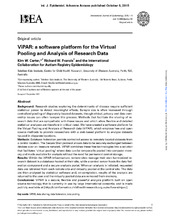ViPAR: a software platform for the Virtual Pooling and Analysis of Research Data
Peer reviewed, Journal article
Published version

Åpne
Permanent lenke
https://hdl.handle.net/1956/11770Utgivelsesdato
2015-10-08Metadata
Vis full innførselSamlinger
Originalversjon
https://doi.org/10.1093/ije/dyv193Sammendrag
Background: Research studies exploring the determinants of disease require sufficient statistical power to detect meaningful effects. Sample size is often increased through centralized pooling of disparately located datasets, though ethical, privacy and data ownership issues can often hamper this process. Methods that facilitate the sharing of research data that are sympathetic with these issues and which allow flexible and detailed statistical analyses are therefore in critical need. We have created a software platform for the Virtual Pooling and Analysis of Research data (ViPAR), which employs free and open source methods to provide researchers with a web-based platform to analyse datasets housed in disparate locations. Methods: Database federation permits controlled access to remotely located datasets from a central location. The Secure Shell protocol allows data to be securely exchanged between devices over an insecure network. ViPAR combines these free technologies into a solution that facilitates ‘virtual pooling’ where data can be temporarily pooled into computer memory and made available for analysis without the need for permanent central storage. Results: Within the ViPAR infrastructure, remote sites manage their own harmonized research dataset in a database hosted at their site, while a central server hosts the data federation component and a secure analysis portal. When an analysis is initiated, requested data are retrieved from each remote site and virtually pooled at the central site. The data are then analysed by statistical software and, on completion, results of the analysis are returned to the user and the virtually pooled data are removed from memory. Conclusions: ViPAR is a secure, flexible and powerful analysis platform built on open source technology that is currently in use by large international consortia, and is made publicly available at http://bioinformatics.childhealthresearch.org.au/software/vipar/
